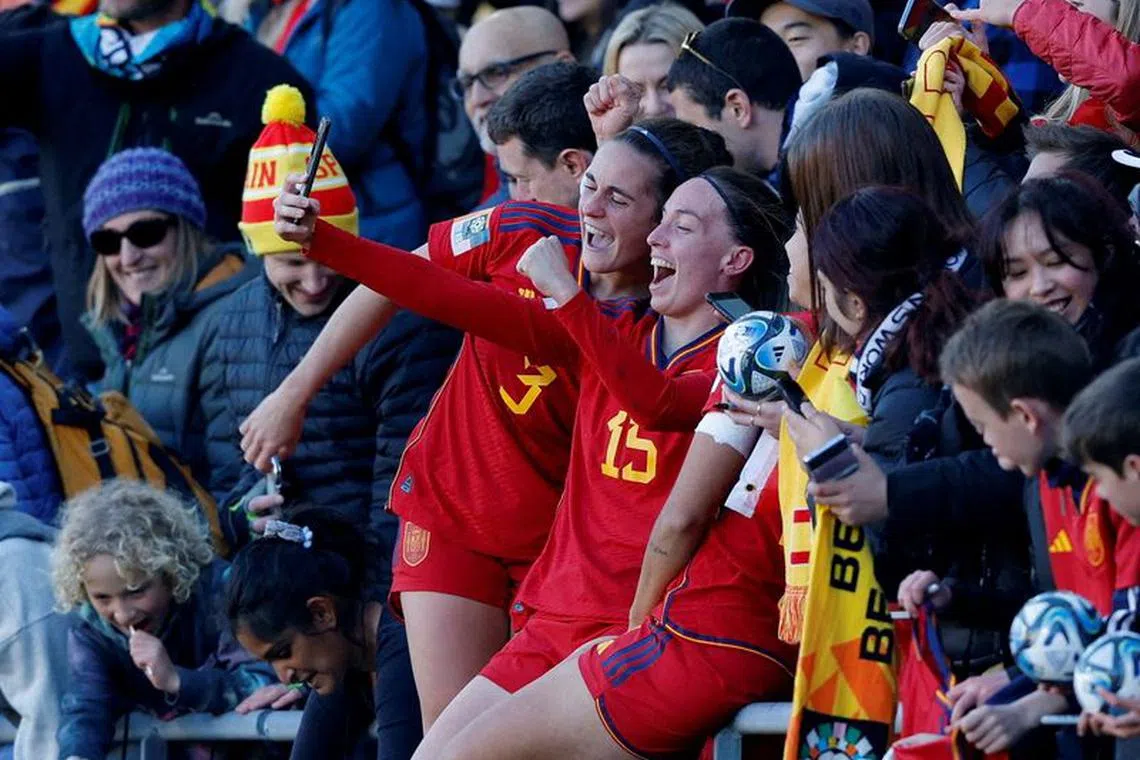New Zealand makes $90 million from football’s Women’s World Cup
Sign up now: Get ST's newsletters delivered to your inbox

Spain's Teresa Abelleira and Eva Navarro celebrate with fans after progressing to the semi-finals of the Women's World Cup.
PHOTO: REUTERS
Follow topic:
WELLINGTON – New Zealand received a net economic benefit of NZ$109.5 million (S$90.4 million) from co-hosting the Women’s World Cup with Australia
The report said that 27,000 people visited the country during the July 20 to Aug 20 tournament and they spent more than NZ$80 million in total on accommodation, meals, transport and shopping.
Despite being better known for their enthusiasm for rugby, New Zealanders also embraced the tournament with more than 740,000 tickets issued for the 29 matches that were staged in Auckland, Wellington, Hamilton and Dunedin.
Although ticket sales were sluggish for some matches and world football body Fifa gave away thousands of tickets, the record for a crowd for a football match in the country was surpassed twice and then tied twice more at Auckland’s Eden Park. Spain’s thrilling 2-1 semi-final victory over Sweden was watched by a sell-out crowd of 43,217 at the venue.
The attendance record was first broken on the opening day of the tournament when 42,137 saw New Zealand beat Norway. It was surpassed at Spain’s last-16 win over Switzerland with a capacity crowd of 43,217 and then further matched by Sweden’s quarter-final victory over Japan, and a similar figure at Spain’s semi-final win.
Overall, the country received NZ$1.34 from every dollar invested in the tournament, the report said, and the total economic benefit was more than double what the government had expected.
“It was the largest and most successful women’s sporting event ever, exceeding expectations on and off the field,” said Kylie Hawker-Green, major events manager at the Ministry of Business, Innovation and Employment.
“It captured the hearts of the nation, elevated women’s football and sport more generally while cementing New Zealand’s global reputation as an exceptional major event host.”
It was unclear how much Australia made from co-hosting the tournament, which generated more than US$570 million (S$757.1 million) for Fifa, enabling the global governing body to break even despite a big hike in prize money.
The report also said that more than 60 per cent of New Zealanders had watched a match on TV or online, while 87 per cent of spectators felt that the global event helped improve their understanding and appreciation of women’s sport.
Unfortunately for the Football Ferns, they failed to reach the knockout stages after a 1-0 defeat by the Philippines in Wellington and drawing 0-0 with Switzerland in Dunedin in the group stage.
Australia lost 3-1 to runners-up England in the semi-final in Sydney, but could be proud as fourth place was still their best World Cup performance. REUTERS

